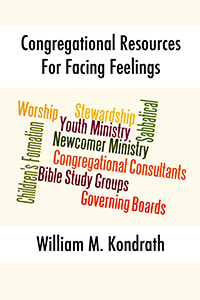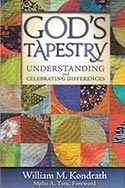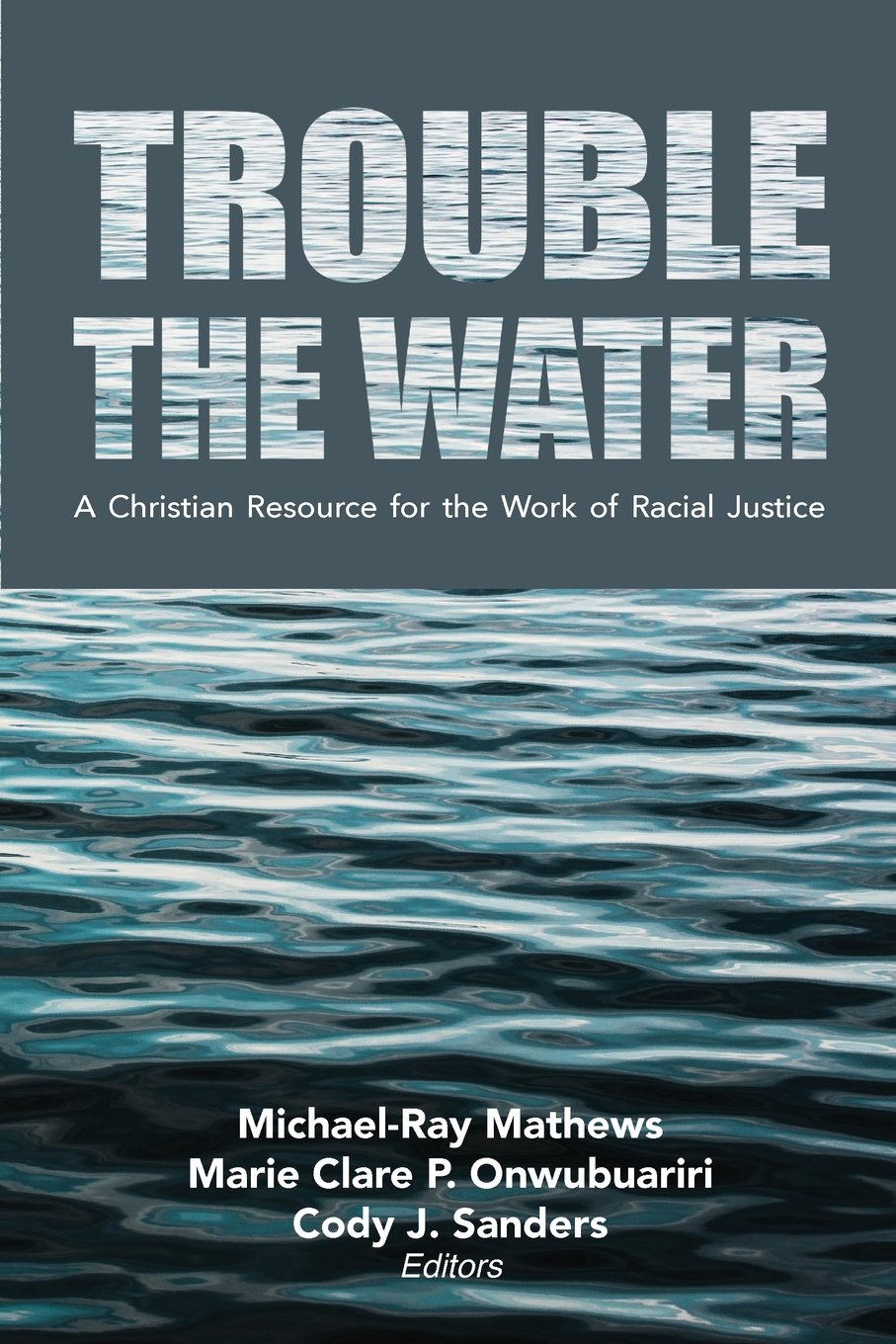Books and Articles
 Facing Feelings in Faith Communities.
Facing Feelings in Faith Communities.
Published by Rowman & Littlefield Publishers | Alban Book, 2013. 182 pages.
Facing Feelings in Faith Communities is based on a simple premise: We have emotions because we need them. God created us as affectively competent beings to help us understand our world and to give appropriate signals to people around us about what we are experiencing. When we express our feelings clearly, other people can more easily respond in ways that are helpful to us, thus enhancing our relationships and the work we might do together. More here » (Actual cover on publisher's site may vary)Congregational Resources for Facing Feelings
(Actual cover on publisher's site may vary)Congregational Resources for Facing Feelings
Published by Rowman & Littlefield Publishers | Alban Book, 2013
This a companion collection to Facing Feelings in Faith Communities by William Kondrath. This collection of practical applications for congregational situations in which exercising greater emotional competence will improve both our understanding of what is happening and the effectiveness of our actions and those of others. More here »
INDIVIDUAL CONGREGATIONAL RESOURCE ARTICLES
-
"Feelings, Substitution, and Emotional Transparency" [Overview article] link>>
-
"The Role of Feelings in the Governing Board" link>>
-
"The Role of Feelings in Newcomer Ministry" link>>
-
What if you paid as much attention to the feelings of visitors to your congregational as to what they were wearing or what mode of transportation they used to get to you?
-
"The Role of Feelings in Bible Study Groups" link>>
-
Bible Study Groups contains instructions for dramatic presentation of scriptural stories, including a surprise ending to the Good Samaritan story that you will never forget!
-
"The Role of Feelings in Children's Formation and Worship" link>>
-
"The Role of Feelings in Teen and Youth Ministry" link>>
-
"The Role of Feelings in Stewardship Development" link>>
-
"The Role of Feelings in Sabbatical Planning" link>>
-
"The Role of Feelings and Congregational Consultants" link>>
 God's Tapestry: Understanding and Recognizing Differences.
God's Tapestry: Understanding and Recognizing Differences.
Published by Rowman & Littlefield Publishers | Alban Book, 2008. 285 pages.
Within every group, organization, parish/congregation, or community, there is an inevitable, well established, and complex diversity of differences. These might be dimensions of cultural background, political affiliation, race, economic status, sexual or gender ... there is a multitude of ways people differ in attitude, approach and sensitivities. By understanding, recognizing, respecting, and embracing these differences - in a public, purposeful, conscientious way, leadership teams and the communities they serve can work through conflict, resistance, and upsetment angers. There are effective ways to transform potentially destructive issues into a collaborative experience of mutual understanding, enriched depth, and more meaningful belonging for members and participants. This book explores guiding that process to fruition. More here »
 "Feelings, Multiculturalism, and the Work of Racial Justice" in Trouble the Water: A Christian Resource for the Work of Racial Justice. Michael-Ray Mathews, Marie Clare P. Onwubuariri, Cody J. Sanders, Editors (Macon, GA: Nurturing Faith Inc., 2017), pp 73-81. view and/or download pdf here »
"Feelings, Multiculturalism, and the Work of Racial Justice" in Trouble the Water: A Christian Resource for the Work of Racial Justice. Michael-Ray Mathews, Marie Clare P. Onwubuariri, Cody J. Sanders, Editors (Macon, GA: Nurturing Faith Inc., 2017), pp 73-81. view and/or download pdf here » - Trouble the Water is a resource for individuals and congregations that takes seriously the necessity ot work toward racila justice while attending to the intersectionality of our identities. The authors address the theory and theology of racial justice and provide praxis-oriented chapters of actual congregational experiences. | See book entry on Amazon here »
- "Power, Affect, and Meaning as Domains of Communication." Article by Bill Kondrath in Journal of Religious Leadership. Vol. 19, No. 2. Autumn 2019. Link »
This paper situates the discussion of power alongside discussions of meaning and affect. Drawing upon systems theorist, organizational consultant, and clinical researcher David Kantor, I begin by presenting power as a communication domain, both a territory where actions take place and an orientation that reveals the aim or purpose of the person speaking or acting. Reflections from Rabbi Jonathon Sacks and theorists from the relational-cultural school of psychology are offered as complements to Kantor’s work. The goal is to integrate the discussion of leadership and power into a holistic framework that accounts for the multidimensionality of leadership. Finally, three types of transparency will be addressed in relation to leadership.
- Check out Kondrath articles on Alban.org - see here »
- Facing Feelings in Faith Communities - a Q&A with Bill Kondrath - see here »
- Feelings as Entry Points to Engaging and Valuing Differences - This text appeared as an article in Crux, October 2014 (Volume 3 Issue 1 pp 19-20). Crux is a publication of the Episcopal Diocese of Connecticut. - Link »
- Book Review of When Getting Along Is Not Enough: Reconstructing Race in Our Lives and Relationships. By Maureen Walker. New York: Teachers College Press, 2020. 153 pp. $31.95 (paper). Link »
- Book Review of The Last Pastor: Faithfully Steering a Closing Church. By Gail Cafferata. Louisville, Kentucky: Westminster John Knox Press, 2020. 215 pp. $25.00 (paper). Link »
- Kite Strings and Clotheslines: Learning to Value Differences - an exercise to introduce people to the dynamics of understanding and valuing differences. Link »
- Affective Competence and Missional Identity - ... a faith community benefits when its members become more skilled in recognizing their own feelings and the feelings of the other members. In such a community, communication is more direct and effective. Meetings run more smoothly. The causes and dimensions of conflict are more identifiable and thus more appropriately engaged....
An article is adapted and excerpted from Facing Feelings in Faith Communities by William M. Kondrath, copyright © 2013 by the Alban Institute. All rights reserved - Link »  Liberating Leadership: Practical Styles for Pastoral Ministry (Harper & Row, 1986), in collaboration with Bernard Swain - More here » Liberating Leadership discusses the ideals, characteristics, accountability, Support and supervision in four distinct systemic leadership styles: Sovereign or Hierarchical,Parallel, Semi-Mutual, and Mutual. Understanding the benefits and limitations of the styles allows lay and clergy staff to engage in deeper conversations of how they work together. (see related article "Styles of Ministerial Leadership" - see next item below)
Liberating Leadership: Practical Styles for Pastoral Ministry (Harper & Row, 1986), in collaboration with Bernard Swain - More here » Liberating Leadership discusses the ideals, characteristics, accountability, Support and supervision in four distinct systemic leadership styles: Sovereign or Hierarchical,Parallel, Semi-Mutual, and Mutual. Understanding the benefits and limitations of the styles allows lay and clergy staff to engage in deeper conversations of how they work together. (see related article "Styles of Ministerial Leadership" - see next item below)
- Styles of Ministerial Leadership in Human Development by William Kondrath "Styles of Ministerial Leadership" published in Human Development 6, Fall, 1985, pp 30-33 - read online here » This article predates the book Liberating Leadership and includes a gender analysis of various systemic leadership styles.
- Transitioning from Charismatic Founder to the Next Generation - Journal of Religious Leadership, Fall 2010. More here » This article discusses 12 dimensions that congregations and religious organizations need to attend to during the transition from founder (or long-term leader) to the next generation including: vision, accountability, governance, problem solving, conflict, expressing of feelings, communication, roles, and policies.
- The Power of Feelings Named number 1 of the "Top Ten Articles of 2009" by the Alban Institute: William Kondrath paints an illustration of the power of feelings and the tendency of most groups to ignore feelings and focus on intellectual or cognitive explanations for nearly everything. Once his congregation explored their feelings, they were transformed into a tighter community that worked together more effectively.- Link »
- Creating a Ministering Community in The Witness (March, 2000)
- Field Education and Clinical Pastoral Education: Desired Outcomes from the Perspective of Those Making Decisions about Ordination in The Journal of Supervision and Training in Ministry. Volume 22, 2002, 147-164.
A study based on a survey of leaders in four denominations (Roman Catholic, Unitarian Universality, Episcopal, and United Church of Christ) who have oversight for ordination, looking at their hoped for outcomes from field education and clinical pastoral education. The study also questioned these leaders about their use of evaluations in determining eligibility for ordination. Link » - The Role of Feelings as Messengers in Supervision and Theological Reflection in The Journal of Supervision and Training in Ministry. Volume 25, 2005
The thesis of this article is that supervision and theological reflection have primarily been done as intellectual exercises. I am offering a method that also values and promotes emotional competence in the art and science of supervision and theological reflection. The theory behind this method focuses on the role of feelings in supervision and theological reflection. It asserts that feelings carry messages that give us information about how to act ethically toward others and ourselves, and that these messages offer us options for sustaining and deepening relationships.... pdf download here »
- The Journal of Religious Leadership
- "Light and Leadership" - an excerpt from the introduction to the Journal of Religious Leadership (JRL) 15(1) (Spring 2016)
..." It seems to me that the traditional paradigm for leadership was focused on the personality and gifts of a single leader whose values, goals, and actions appeared in the spotlight. This implied that other leaders were either in the edges of the light or had to share the spotlight, if allowed to do so by the primary leader. The other members of the faith community were more or less in the dark...."
- view and/or download here » (link opens in new browser page)
- "The Role of Emotions in Religious Leadership and Community" in the Journal of Religious Leadership (JRL) Fall 2014 issue
..."Most of what is written and taught about leadership focuses on what individuals think and how they behave. When emotions are discussed, the conversation most often centers on how to overcome, transform, or minimize the influence of feelings. Emotions are rarely seen to be the positive key to unlocking stalemates or the catalyst for freeing up stuck communities"...
- view and/or download here » (link opens in new browser page)
- "Surfacing Emotions to Teach Leadership" by Rob Muthiah Journal of Religious Leadership Fall 2018 issue
...This article uses research from neuroscience and educational pedagogy to talk about the the importance of emotions in learning and in leadership. The footnotes are a rich resource for recent publications on emotions and leadership...
- view and/or download here » (link opens in new browser page)
- "Light and Leadership" - an excerpt from the introduction to the Journal of Religious Leadership (JRL) 15(1) (Spring 2016)